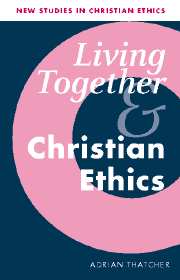Book contents
- Frontmatter
- Contents
- General editor's preface
- Acknowledgments
- PART 1 LIVING TOGETHER AS A THEOLOGICAL PROBLEM
- 1 A guide to living together
- 2 Living together: a preliminary theological analysis
- 3 Testing the betrothal solution
- PART 2 AN EXERCISE IN RETRIEVAL: BRINGING BACK BETROTHAL
- PART 3 EXTENDING THE MARITAL NORM
- Appendix: A Rite of Betrothal before Marriage
- Bibliography
- Index
2 - Living together: a preliminary theological analysis
Published online by Cambridge University Press: 04 August 2010
- Frontmatter
- Contents
- General editor's preface
- Acknowledgments
- PART 1 LIVING TOGETHER AS A THEOLOGICAL PROBLEM
- 1 A guide to living together
- 2 Living together: a preliminary theological analysis
- 3 Testing the betrothal solution
- PART 2 AN EXERCISE IN RETRIEVAL: BRINGING BACK BETROTHAL
- PART 3 EXTENDING THE MARITAL NORM
- Appendix: A Rite of Betrothal before Marriage
- Bibliography
- Index
Summary
The previous chapter was a ‘pre-theological’ attempt to understand an international social phenomenon prior to beginning theological analysis and reflection upon it. A whole book might be devoted to the selection of appropriate methods, principles, and applications. It may help to confess to the reader that the present author affirms mainstream Christian faith, and believes the Christian tradition is far too revelatory and insightful to be left to so-called ‘traditionalists’. I say the creed cheerfully and thankfully (and as a practising Anglican, frequent opportunities arise). I have set out elsewhere the loyalties to which I believe any Christian theologian should adhere as a determining and liberating influence. However, an author's prior commitments are no substitute for a clear account of the adopted method for dealing with an ethical problem.
So: the theological analysis gets started by contrasting the negative results of the guide to cohabitation with what Christians understand by salvation (first section). The analysis soon reaches a crossroads. A basic distinction is required between two types of cohabitation, ‘prenuptial’ and ‘non-nuptial’ (second section): thereafter one type only (prenuptial) becomes the preoccupation of the book. What will be called throughout the book ‘the marital norm’ is advocated, but because of the difference between norms and ‘rules’ what is the general norm for sexual relations in Christianity need not also be the rule in every case of sexual relations (third section).
- Type
- Chapter
- Information
- Living Together and Christian Ethics , pp. 39 - 75Publisher: Cambridge University PressPrint publication year: 2002



